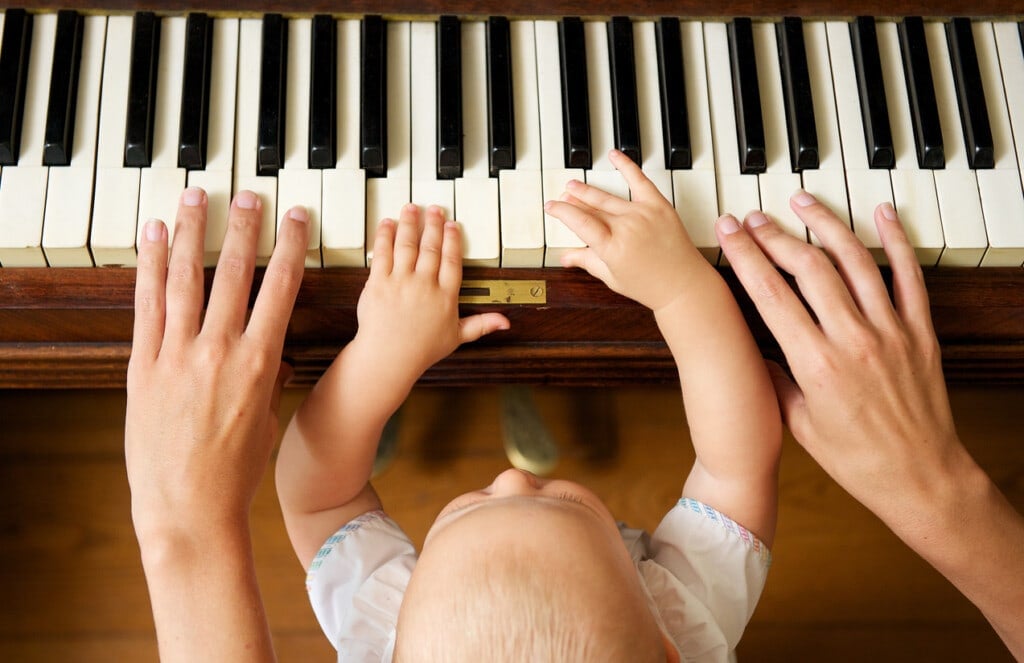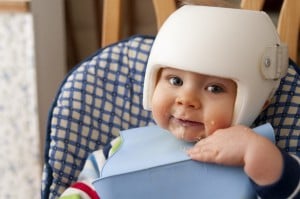When I was grocery shopping the other day, a Spice Girls song came blaring through the loudspeaker. I found myself frozen between the deli and the obscenely large assortment of Special K. Being the ’90s child I am, three thoughts popped into my brain:
“Whoever is responsible for this stellar playlist deserves a raise.”
“Screw the low-sugar, high-protein smart choice cereal. I deserve the Cocoa Pebbles that 10-year-old me would choose.”
“I can’t even remember what I came to this store to get without a detailed shopping list. How do I know every line of this song down to zig-a-zig, ah? And why am I smiling?”
Standing in the middle of the store, I was nostalgic for butterfly hair clips and Dunkaroos, and I had a surge of curiosity about the music that shaped my childhood. Now that I have a son of my own, how will music play a role in his life, and what effect does music have on our kids’ brains?
What are the Benefits of Exposing Children to Music?
Some experts believe that exposing children to music can help them improve their ability to communicate with the world.
“Whether it is through their own musical heritage or the exposure to the music of other cultures and regions, music can teach children cooperation, tolerance, patience, and group awareness,” explains Bloomingdale School of Music Early Childhood Coordinator Patti Onorato.
Onorato also believes music is vital to a child’s development of language and listening skills.
“Musical activities can improve attention span, memory, and improve vocabulary,” she said.
Rosie Rion Porco, the New York School of Music owner, believes practicing music can also teach children perseverance because it constantly challenges them to work harder and improve.
“Music kids learn from their mistakes and have the confidence in themselves to keep trying. They also have the ability to put themselves out into the world, knowing that with proper preparation, they can put their best foot forward,” Rion Porco said.
Are Baby Music Classes a Good Idea?
According to scientific studies, it’s time to enroll my son in music class. You might consider it for your kids, too! A series of play sessions with music improved 9-month-old babies’ brain processing of both music and new speech sounds, according to a study from the University of Washington’s Institute for Learning & Brain Sciences (I-LABS).1
The scientists concluded that early, engaging musical experiences could enhance the processing of sounds that can help with speech processing.1
“I’ve experienced children learning how to speak using rhythmic speech patterns and songs in music class,” Onorato said. “I’ve seen babies take their first steps while pushing the gathering drum. Rhythmic movement and playing age-appropriate instruments are great ways to help children with fine and gross motor skills development.”
An added plus Onorato has seen? Social-emotional learning and development in babies and toddlers. They make friends, share, take turns, and bond with their grownups.
“The earlier, the better,” adds Rion Porco. “Much of musical training at a later age is just trying to get students to let go of their insecurities. Children who have early exposure typically don’t deal with that as much.”
How Do Different Styles of Music Help Children Develop Skills?
Although children and grownups might have different tastes in music, studies have shown that various music styles affect us similarly. Think about how you feel when a sad breakup song blasts through the radio after a long day at work versus your favorite Florence + the Machine jam that powers you through the end of your workout.
When we hear the music we like, our brain releases dopamine which makes us happy.
A new study found that dopamine2 — a neurotransmitter that plays an essential role in our cognitive, emotional, and behavioral functioning — directly affects the reward experience induced by music. The new findings were published in the Proceedings of the National Academy of Sciences.3
According to the study, “humans regularly seek participation in highly complex and pleasurable experiences such as music listening, singing, or playing, that do not seem to have any specific survival advantage.” 3
What Music Styles Help Kids’ Brains?
Genres of music like pop, hip hop, country, and reggae can be repetitive, catchy, and fast-paced, making a listener want to dance and sing along, Onorato explains. In contrast, classical and jazz music is less repetitive and more complex.
“It is said these styles of music help improve focus and visual attention, and contribute to a positive attitude,” Onorato notes. “Metal and rock are said to—ironically—help people cope with stress and feel calm with loud growls, screams, and drumbeats. Melancholy music has been known to help listeners process their emotions, reflect, and eventually feel better.”
“I see different character-building opportunities in different genres,” explains Rion Porco. “Classical, jazz, and bluegrass, for example, are highly technical, whereas pop is more centered on putting together a whole artistic product. Rock is about truth-telling and authenticity.”
What Music is Calming for Kids?
During a recent session with pre-k students, Onorato was watching the children during their rest time and decided to experiment with playing classical Mozart music versus meditation music.
“The children were very chatty during Mozart and were actively listening to the music. During the meditation music, they immediately settled down, and many of them fell right asleep,” she recalls. “Healing or meditation music directly impacts the parasympathetic nervous system, helping your body relax and prepare for sleep.”
Do Instrument Lessons Help Kids’ Brains?
Much evidence shows that music activities engage the left, right, front and back portions of the brain.4 In a study at the University of Toronto, researchers found that music lessons on the keyboard or voice raised the IQ of young children higher than that of kids who did not take lessons.5
Research on children and adults suggests that musical abilities predict phonological skills in language, like reading.6
“Studying music involves more right-brain and left-brain functions than any other activity measured,” says Onorato. “Studying music also helps to develop a child’s sensitivity to beauty.”
“We do see a pattern and have heard from parents that our students perform better in school since taking music lessons,” says Rion Porco.
While music’s magic is undeniable, remember that all kids gravitate toward music in their way. One child may be excited to participate in every musical activity you offer; another may take more time to develop an interest. Kids grow at their own unique pace and have quirks, interests, preferences, and dislikes.
Exposing children to various sounds can be a beautiful way to encourage self-expression and lifelong love. Whether your child becomes the next Beethoven or finds joy from banging on the pots and pans you have in the kitchen; music can offer a rewarding outlet and a gift for anyone who opts to explore it.































